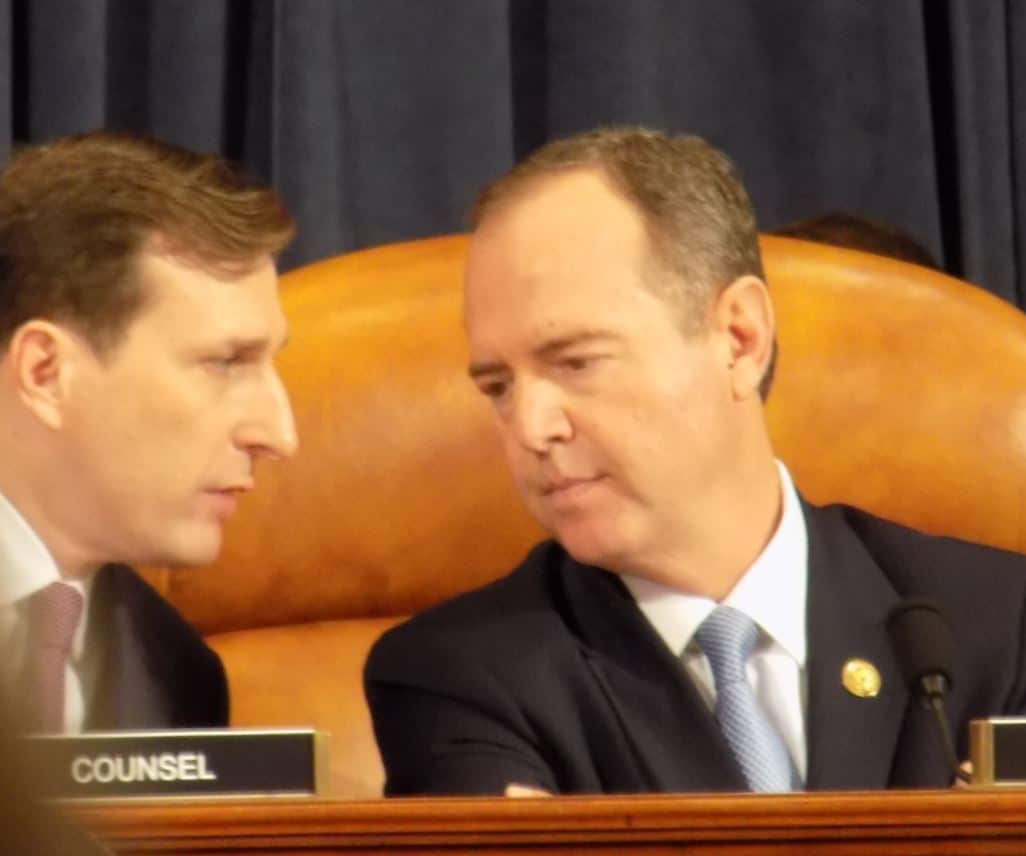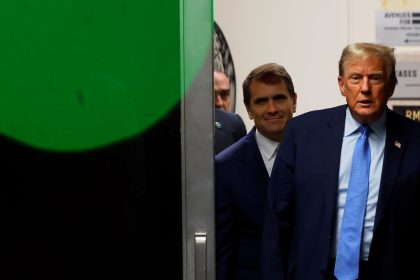Where The Impeachment Case Stands as Democrats Prepare to Bring a Barrage of New Witnesses

WASHINGTON — Democrats this week enter a do-or-die phase of their impeachment inquiry following a week of public testimony, as they summon a flurry of witnesses they hope will convince the public that President Trump should be impeached for pressing a foreign government to launch criminal investigations for his political benefit.
The hearings follow a rare weekend in which a key White House official was deposed and the transcripts were released from two additional closed-door depositions of administration officials.
Earlier in the week three veteran diplomats testified in public, soberly describing the ramifications of the president’s pressure campaign — undermining Ukraine, a stalwart U.S. ally at war with Russia, and eroding U.S. stature across the globe, they said.
Constitutional scholars say Democrats have succeeded in laying important groundwork. Now the hard part begins: proving that Trump abused his power and that his actions are serious enough to justify his impeachment.
“Democrats have done well so far,” said Jonathan Turley, a law professor at George Washington University, noting that the public hearings have produced some damaging moments for the White House. “The next week will prove key. They will have to show this is big enough to justify the impeachment and removal of a president.”
Turley and other constitutional scholars said Republicans struggled to find a coherent narrative in defending Trump, though they scored points by arguing that no witnesses have provided direct evidence linking the president to nefarious activity.
This week, Republican House members are likely to continue pounding a point that some GOP senators have raised: that even if true, the allegations don’t rise to the level of impeachable conduct.
“When we’re talking about impeachment, we are talking about impeachable offenses,” said Rep. Elise Stefanik (R-N.Y.), who has emerged as a leading GOP voice in the inquiry. “The Democrats want to continue making this a political food fight. They are going about this in a partisan way.”
Democrats hope to wrap up the inquiry by the end of the year. If Trump becomes the third president to be impeached, he will face trial in the Senate to determine whether he should be removed from office.
The accelerated schedule is responsible for the onslaught of witnesses expected to testify publicly this week. Eight current and former administration officials are scheduled to testify over three days.
On Saturday, Mark Sandy, a career official at the Office of Management and Budget, testified behind closed doors about his work on Ukraine matters. Sandy’s decision to testify was significant because the OMB froze funds headed to Ukraine’s military as allies of the president pushed Kyiv to launch investigations of Trump political opponents, and because appointees at the OMB have declined to comply with subpoenas for testimony and records. Other White House officials have also declined to cooperate.
Democrats have held weeks of similar closed-door depositions and only started making their case public on Wednesday, when two longtime diplomats testified before the House Intelligence Committee that they saw evidence Trump was hijacking U.S. foreign policy for domestic political gain.
They chronicled a scheme in which administration officials and Trump’s personal lawyer, Rudolph W. Giuliani, prodded Ukraine’s leaders to launch investigations of political opponents to help Trump win reelection in 2020.
In particular, Trump and his associates were pressuring Ukrainian officials to announce inquiries that they hoped would ensnare former Vice President Joe Biden and his son Hunter Biden. From 2014 through April, Hunter Biden served on the board of Burisma, a large energy company that had once been targeted by Ukrainian investigators.
As they pushed for such probes, Trump associates and administration officials dangled the possibility of an Oval Office meeting between Ukrainian President Volodymyr Zelensky and Trump. The White House also froze delivery of nearly $400 million in sorely needed aid to Ukraine’s military. A top U.S. diplomat testified to House investigators that he told a Ukranian official such aid would not be unlocked “until Ukraine provided the public anti-corruption statement that we had been discussing.”
William B. Taylor Jr., the top U.S. diplomat in Ukraine, testified publicly last week that he was astonished by the administration’s decision to delay the funds until Kyiv agreed to announce it was launching what he considered politically motivated investigations. In a contemporaneous text message to another diplomat, he called it “crazy.”
On Friday, former U.S. Ambassador to Ukraine Marie Yovanovitch testified publicly about being ousted from her post amid a “smear” campaign led by Giuliani and his associates after standing in their way. Yovanovitch was ordered to return to the U.S. in May amid a flurry of unfounded rumors that she was anti-Trump.
As Yovanovitch described her plight on Friday, Trump disparaged the diplomat on Twitter, claiming without evidence “that everywhere Marie Yovanovitch went turned bad.” She called the tweet “intimidating.”
This week, Democrats are seeking to apply direct pressure on the White House when they summon Lt. Col. Alexander Vindman of the National Security Council and Fiona Hill, who recently left the NSC, to recount to lawmakers their concerns about Giuliani’s efforts. They, among others, will also be asked about what role Mick Mulvaney, the president’s acting chief of staff, played in halting the flow of funding to Ukraine. Vindman is scheduled to testify on Tuesday and Hill on Thursday.
Democrats are trying to draw “straight lines from the president to his agents,” said Rep. Eric Swalwell (D-Dublin), adding, “We’re just trying to establish the timeline, and then on the shakedown scheme who has a straight line to the president and who doesn’t.”
The most significant — yet unpredictable — witness will be Gordon Sondland, the U.S. ambassador to the European Union, who is scheduled to testify on Wednesday. A wealthy hotelier and Trump campaign donor, Sondland was a key intermediary between Trump and the shadow Ukraine effort.
Sondland originally told lawmakers that he couldn’t remember key conversations with the president about Ukraine. He later told lawmakers in a written follow-up that he did indeed remember telling the Ukrainians that the military aid would not be released without an announced investigation.
Sondland’s proximity to the president became more clear on Wednesday, when Taylor described a phone call between Trump and Sondland that he said took place in July.
Taylor testified that Sondland called Trump from a busy Ukrainian restaurant to provide him with an update on his work in the country, according to David Holmes, a State Department employee based in Kyiv who overheard the conversation.
Testifying Friday behind closed doors before the House Intelligence Committee, Holmes told lawmakers in his opening statement that he recognized Trump’s distinct voice on the phone — the president spoke so loudly that Sondland had to pull the receiver from his ear.
Sondland told Trump that Zelensky will do “anything you ask him to,” according to Holmes’ opening statement, first obtained by CNN and confirmed by The Times. The EU ambassador later told Holmes that Trump only cares about the “big stuff” with respect to Ukraine, meaning items that benefit the president, such as the “Biden investigation.”
The ambassador did not mention the July 26 phone call during his deposition, and Democrats are likely to zero in on that discrepancy among others.
“Sondland is important,” said Rep. Raja Krishnamoorthi (D-Ill.), a member of the House Intelligence Committee. “As you can tell, he talked to the president very frequently — he could even call him up on a cellphone, apparently from a bar or restaurant in the middle of Kyiv.”
Sondland’s tight relationship with Trump was evident in testimony released Saturday of Tim Morrison, who was still a top White House national security official when he spoke to House investigators in October. He testified Sondland often claimed to be acting on Trump’s orders and was frequently in touch with the president, according to a transcript of his closed-door interview.
Morrison said he checked whether Sondland was really speaking to Trump, and “every time he told me he had a conversation … I was able to confirm a call happened,” according to a transcript released Saturday of a deposition he gave to House investigators last month.
———
Times staff writer Tracy Wilkinson contributed to this report.
———
©2019 Los Angeles Times
Visit the Los Angeles Times at www.latimes.com
Distributed by Tribune Content Agency, LLC.
























